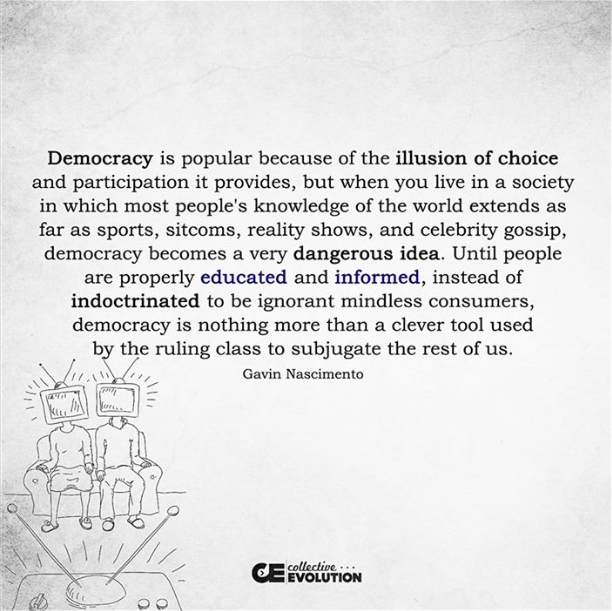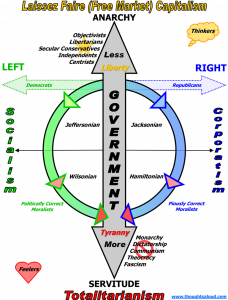Archive for the ‘Anarchy’ Category
 AR: Purpose
AR: Purpose
[Note: Posts with titles that begin with “AR:“ are stubs for the project described at “America Reborn,” which probably should be read first…]
Alas, it is with great disappointment that I can see already that I am not going to be very helpful with this project. I had difficulty even picking a relevant stub for this comment. Thus, I will add this new one. What exactly is to be the purpose of America 2.0?
As I understood our mission, it was to design a workable replacement societal structure, for the rapidly collapsing America 1.0. I find I am not ready to concede the basic premise inherent in the descriptions of these stubs; namely that whatever their forms, there must again be a nation-state, with a hierarchy of ancillary governments to control the population.
Next to my life, my personal Liberty, and individual Sovereignty, are at the top of my hierarchy of values. I regard what is being referred to here as ‘limited government,’ as instead a ‘coercive’ entity, providing ‘limited Liberty’ and perhaps ‘limited Sovereignty,’ for the ‘altruistic’ benefit of the ‘collective,’ all of which are odious concepts to me.
As I have suggested, I think I have some workable ideas that do not require coercion, or empowering anyone to violate enlightened civilization’s fundamental non-aggression axiom. Before I can figure out how to incorporate them into these categories, I need the answer to the above question… what is to the fundamental purposes we are trying to achieve? If I could demonstrate how they might be achieved without government, will anyone be willing to entertain such ideas seriously? â—„Daveâ–º
 Illusion of Choice
Illusion of Choice
This is very well put:

Yeah, the negative choice of the lesser of two evils… Please just Stop Voting; it only legitimizes and encourages the insufferable bastards. What would happen if they held an election, and nobody came? 🙁 â—„Daveâ–º
 The Big Club
The Big Club
Robert Ringer has republished an article I had already read the other day entitled, “2016: The Year the Americans Found out Our Elections Are Rigged,” which included:
What we are witnessing — for the first time on a large scale — is the political establishment’s true role in selecting the president of the United States. The illusion of choice has become apparent. The establishment anoints their two picks for president, and the country proceeds to argue vehemently over the two candidates they are spoon-fed. This dynamic is reminiscent of a prophetic 1998 quote from philosopher Noam Chomsky:
“The smart way to keep people passive and obedient is to strictly limit the spectrum of acceptable opinion, but allow very lively debate within that spectrum.â€
Ahh, the illusion of choice. Sure, in reality there are third party candidates who should be given a fair shake, but in our mainstream media-augmented reality, third parties do not exist. They aren’t mentioned. They aren’t even included in presidential debates. This is another way the media stifles healthy debate, stamps out dissenting opinions, and preserves the status-quo.
“We The People†don’t choose our presidents; they are hand-picked by a powerful group of political party insiders — parties that have long since sold out to the highest bidders. What we have on our hands in America is a rigged oligarchy, and that’s not a conspiracy theory — it’s fact. Now, however, millions of Americans are becoming aware of it thanks to the populist campaigns of Bernie Sanders and Donald Trump. America’s elections are controlled by a big club, but unfortunately, “you ain’t in it!â€
Carlin had this figured out long before I ever got around to seriously thinking about it. So, once again I ask, why do we legitimize their rule over us by voting in their sham elections? â—„Daveâ–º
 Look Around
Look Around
I have stumbled across a profound and thought-provoking academic essay, which effectively slays most common arguments that governments are necessary for a modern peaceful society to exist. A downloadable PDF, it is entitled, “The Obviousness of Anarchy,” by John Hasnas, Â Associate Law Professor, Georgetown University, J.D., Ph.D, LL.M. Those familiar with my Montessori education background, will understand why my antenna went up when I read:
“The author wishes to thank … Annette Hasnas of the Montessori School of Northern Virginia for a real world illustration of how rules evolve in the absence of centralized authority.”
My reaction was, well of course, a Montessori classroom of 3 to 5-year-old children, is a perfect example of spontaneous order and a smoothly functioning laissez faire society. How had it not occurred to me before to use that analogy? I certainly shall develop it in the future.
The essay begins:
The Obviousness of Anarchy
by John Hasnas
“You see, but you do not observe.â€
Sherlock Holmes to Dr. John Watson in A Scandal in Bohemia
I. Introduction
In this article, I have been asked to present an argument for anarchy. This is an absurdly easy thing to do. In fact, it is a task that can be discharged in two words–look around. However, because most of us, like Dr. Watson, see without observing the significance of what we see, some commentary is required.
Anarchy refers to a society without a central political authority. But it is also used to refer to disorder or chaos. This constitutes a textbook example of Orwellian newspeak in which assigning the same name to two different concepts effectively narrows the range of thought. For if lack of government is identified with the lack of order, no one will ask whether lack of government actually results in a lack of order. And this uninquisitive mental attitude is absolutely essential to the case for the state. For if people were ever to seriously question whether government actions are really productive of order, popular support for government would almost instantly collapse.
The identification of anarchy with disorder is not a trivial matter. The power of our conceptions to blind us to the facts of the world around us cannot be gainsaid. I myself have had the experience of eating lunch just outside Temple University’s law school in North Philadelphia with a brilliant law professor who was declaiming upon the absolute necessity of the state provision of police services. He did this just as one of Temple’s uniformed private armed guards passed by us escorting a female student to the Metro stop in this crime-ridden neighborhood that is vastly underserved by the Philadelphia police force.
A wise man once told me that the best way to prove that something is possible is to show that it exists. That is the strategy I shall adopt in this article. I intend to show that a stable, successful society without government can exist by showing that it has, and to a large extent, still does.
The way he casually unpacked the Orwellian corruption of the term ‘anarchy’ was masterful. I tend to get frustrated at the callous abuse of the English language, and am not as artful as he, at explaining how and why I am using a venerable word in its original sense.
 Abstain From Beans
Abstain From Beans
Abstain From Beans
by Robert LeFevre (1911-1986)
In ancient Athens, those who admired the Stoic philosophy of individualism took as their motto: “Abstain from Beans.” The phrase had a precise reference. It meant: don’t vote. Balloting in Athens occurred by dropping various colored beans into a receptacle.
To vote is to express a preference. There is nothing implicitly evil in choosing. All of us in the ordinary course of our daily lives vote for or against dozens of products and services. When we vote for (buy) any good or service, it follows that by salutary neglect we vote against the goods or services we do not choose to buy. The great merit of market place choosing is that no one is bound by any other person’s selection. I may choose Brand X. But this cannot prevent you from choosing Brand Y.
When we place voting into the framework of politics, however, a major change occurs. When we express a preference politically, we do so precisely because we intend to bind others to our will. Political voting is the legal method we have adopted and extolled for obtaining monopolies of power. Political voting is nothing more than the assumption that might makes right. There is a presumption that any decision wanted by the majority of those expressing a preference must be desirable, and the inference even goes so far as to presume that anyone who differs from a majority view is wrong or possibly immoral.
But history shows repeatedly the madness of crowds and the irrationality of majorities. The only conceivable merit relating to majority rule lies in the fact that if we obtain monopoly decisions by this process, we will coerce fewer persons than if we permit the minority to coerce the majority. But implicit in all political voting is the necessity to coerce some so that all are controlled. The direction taken by the control is academic. Control as a monopoly in the hands of the state is basic.
In times such as these, it is incumbent upon free men to reexamine their most cherished, long-established beliefs. There is only one truly moral position for an honest person to take. He must refrain from coercing his fellows. This means that he should refuse to participate in the process by means of which some men obtain power over others. If you value your right to life, liberty, and property, then clearly there is every reason to refrain from participating in a process that is calculated to remove the life, liberty, or property from any other person. Voting is the method for obtaining legal power to coerce others.
~ +++ ~
Note: This classic article was obviously written sometime prior to 1986. It is reprinted all over the net, and I was unable to locate the original digital source, so I have taken the liberty of memorializing its profound sagacity here as well. Since it is a rather cogent explanation of my own oft expressed motto: “Don’t Vote – It Just Encourages the Bastards,” I look forward to any discussions of it. Particularly, any reasonable arguments against it. â—„Daveâ–º
